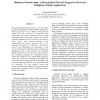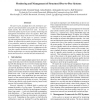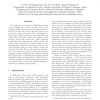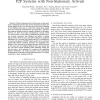101
Voted
P2P
2009
IEEE
15 years 9 months ago
2009
IEEE
A Distributed Hash Table (DHT) is a structured overlay network service that provides a decentralized lookup for mapping objects to locations. In this paper, we study the lookup pe...
104
Voted
P2P
2009
IEEE
15 years 9 months ago
2009
IEEE
Peer-to-peer (P2P) based marketplaces have a number of advantages over traditional centralized systems (such as eBay). Peers form a distributed hash table and store sale offers fo...
121
Voted
P2P
2009
IEEE
15 years 9 months ago
2009
IEEE
We present Badumna Network Suite, a network engine for Massively Multiplayer Online (MMO) applications. MMO applications such as World of Warcraft and Second Life use client-serve...
108
Voted
P2P
2009
IEEE
15 years 9 months ago
2009
IEEE
The peer-to-peer paradigm shows the potential to provide the same functionality and quality like client/server based systems, but with much lower costs. In order to control the qu...
94
Voted
P2P
2009
IEEE
15 years 9 months ago
2009
IEEE
Peer-to-peer content dissemination applications suffer immensely from freeriders, i.e., nodes that do not provide their fair share. The Tit-for-Tat (TfT) incentives have received ...
94
Voted
P2P
2009
IEEE
15 years 9 months ago
2009
IEEE
ID uniqueness is essential in DHT-based systems as peer lookup and resource searching rely on IDmatching. Many previous works and measurements on Kad do not take into account that...
81
Voted
P2P
2009
IEEE
15 years 9 months ago
2009
IEEE
111
Voted
P2P
2009
IEEE
15 years 9 months ago
2009
IEEE
—Characterizing user churn has become an important topic in studying P2P networks, both in theoretical analysis and system design. Recent work [26] has shown that direct sampling...
155
Voted
P2P
2009
IEEE
15 years 9 months ago
2009
IEEE
Distributed systems such as Peer-to-Peer overlays have been shown to efficiently support the processing of range queries over large numbers of participating hosts. In such system...
114
Voted
P2P
2009
IEEE
15 years 9 months ago
2009
IEEE
Distributed computing is a very broad and active research area comprising fields such as cluster computing, computational grids, desktop grids and peer-to-peer (P2P) systems. Unf...




